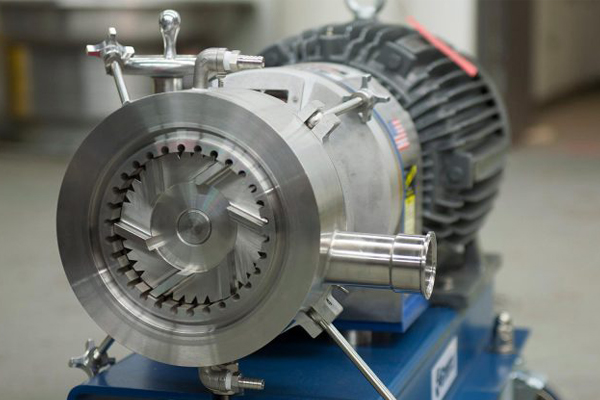DESCRIPTION
An inline colloid mill is a high-shear homogenizer that uses a rotor and stator to create intense shear forces, effectively breaking down particles and droplets in a liquid to produce fine dispersions, emulsions, and suspensions. The mill operates by rotating the rotor at high speed within the stator, generating hydraulic shear and other forces that disrupt and reduce the size of particles.
WORKING PRINCIPLE
Inlet and Rotor :
The material to be processed, whether a liquid or solid-in-liquid mixture, is introduced into the mill through an inlet. The rotor, a rotating component, draws the material into the gap between itself and the stationary stator.
High-Speed Rotation and Shear :
The rotor rotates at high speed, creating a strong suction and centrifugal force. This force pushes the material against the stator, where it experiences intense shear between the rotor and stator surfaces.
Particle Breakdown :
The high shear forces disrupt and break down particles or droplets, reducing their size and creating a more uniform dispersion.
Hydraulic Shear :
As the material is forced through the gap, hydraulic shear forces also contribute to the particle breakdown.
Outlet and Continuous Flow :
The finely processed material is then discharged from the mill through an outlet, often with continuous flow.
KEY FEATURES AND ADVANTAGES
High Shear :
The intense shear forces are crucial for reducing particle size and achieving stable dispersions.
Rotor-Stator Design :
The design facilitates efficient particle breakdown and mixing.
Continuous Processing :
Inline mills are designed for continuous processing, making them suitable for high-volume applications.
Versatility :
They can be used for various applications, including producing emulsions, suspensions, and colloidal solutions.
MIXING MECHANISM OF COLLOIDAL MILL
The first mixing zone utilizes sharp stator teeth to mill the fluid Next, fine serrations accelerate the fluid between the ultra-smooth, hardened surfaces of the spinning rotor and stator gap Finally, and centrifugal forces impinge fluid on stator wall for additional refinemen.
APPLICATIONS
Colloid mills are used in industries like pharmaceuticals, cosmetics, food processing, and chemicals for preparing suspensions, emulsions, and other colloidal systems.
